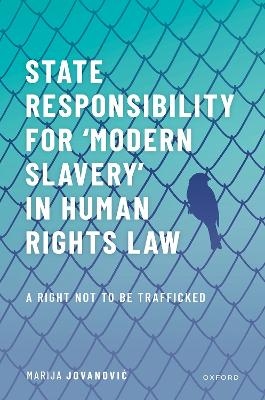
State Responsibility for ʻModern Slaveryʼ in Human Rights Law
Oxford University Press (Verlag)
978-0-19-286708-7 (ISBN)
What is ‘modern slavery’ and who is responsible for it? What is the relevance of human rights law, which primarily regulates state conduct, for practices predominantly committed by private actors? Where can victims seek justice and redress when national authorities fail to protect them? These questions are the core focus of this book.
Marija Jovanovich analyses the role and responsibility of states for addressing ‘modern slavery’ – a diverse set of practices usually perpetrated by non-state actors – against the backdrop of international human rights law. It explores the dynamic between criminal law and human rights law and reveals the different ways these legal domains work to secure justice for victims. The book considers the ‘absolute’ nature of the prohibition of modern slavery in human rights law, the range of practices covered by this umbrella term and their mutual relationships, the positive obligations of states established by international human rights tribunals owed to individuals subject to modern slavery, and the standards for assessing state responsibility in these situations. By engaging with the concept of exploitation in human rights law, Jovanovich glues together diverse practices of modern slavery, including servitude, forced labour, and human trafficking, into a coherent concept. The book elucidates the theoretical foundations of this fundamental human right and explains why human trafficking has an independent place within it. In addition to providing a comprehensive critique of the existing human rights jurisprudence, this book offers a roadmap for the future development of law on this subject emphasizing the limits of human rights law as a tool for addressing modern slavery.
Dr Marija Jovanovic is a Lecturer at the School of Law, University of Essex. Her research focuses on modern slavery and the way this phenomenon interacts with different legal regimes, such as human rights law, criminal law, labour law, immigration law, international trade law, and business regulation. Marija holds DPhil, MPhil, and Magister Juris degrees from the University of Oxford, and a law degree from Serbia. She previously held a Postdoctoral Fellowship in ASEAN Law and Policy at the National University of Singapore, and worked as a Lecturer at the University of Kragujevac and University of Belgrade. She regularly consults for international and non-governmental organisations.
1: Introduction
Part I: Human Trafficking and Human Rights Law
2: On the Legal Nature of Human Trafficking
3: A Right Not to be Trafficked?
4: The Notion of Exploitation - Theoretical Foundations of the Human Rights Prohibition of 'Modern Slavery'
PART II: State Responsibility for 'Modern Slavery' in Human Rights Law
5: Positive Obligations as a Means of Establishing State Responsibility for 'Modern Slavery' in Human Rights Law
6: Human Rights Obligations of States to Address 'Modern Slavery'
7: The Role of Specialised Anti-Trafficking Instruments in Shaping Human Rights Obligations of States to Address 'Modern Slavery'
8: Conclusion: Human Rights Law, Slavery, and State in the 21st Century
| Erscheinungsdatum | 18.04.2023 |
|---|---|
| Verlagsort | Oxford |
| Sprache | englisch |
| Maße | 165 x 241 mm |
| Gewicht | 496 g |
| Themenwelt | Recht / Steuern ► EU / Internationales Recht |
| Recht / Steuern ► Öffentliches Recht ► Völkerrecht | |
| ISBN-10 | 0-19-286708-3 / 0192867083 |
| ISBN-13 | 978-0-19-286708-7 / 9780192867087 |
| Zustand | Neuware |
| Informationen gemäß Produktsicherheitsverordnung (GPSR) | |
| Haben Sie eine Frage zum Produkt? |
aus dem Bereich


